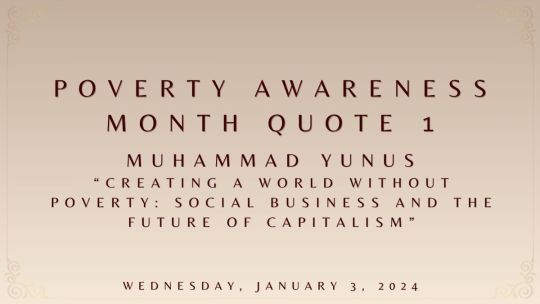#FutureOfCapitalism
Text

TW - POVERTY AWARENESS QUOTE 1
Wednesday, January 3, 2024
“Once poverty is gone, we’ll need to build museums to display its horrors to future generations. They’ll wonder why poverty continued so long in human society – how a few people could live in luxury while billions dwelt in misery, deprivation and despair.”
– Muhammad Yunus, Creating a World Without Poverty: Social Business and the Future of Capitalism
~~~~~~~~~~~~~~~~~~~~~~~~~~~~~~~~~~~~~~~~~~~~~~~~
Check out Global Citizen to see how you can help those in need!
Interested in seeing where the quote came from? If so, click here!
For more about MonriaTitans, click here!
Watch MonriaTitans on Twitch and YouTube!
The first image was made with the Quotes Creator App and,
initially, shared to Instagram; check it out here!
Like what you see? Click here to subscribe for updates!
Please consider supporting through the WGS Ko-fi or the tip page!
View On WordPress
#AffiliateLink#BecomEmpowered#BecomeSmarterEveryday#BEmpowering#Bookshoporg#CreatingAWorldWithoutPoverty#Deprivation#Despair#Educational#EducationalPost#EducationalPosts#EndExtremePovertyNOW#FutureOfCapitalism#GlblCtzn#GlobalCitizen#LearnSomethingNewEveryday#MonriaTitans#MonriaTitansWGS#MuhammadYunus#MuhammadYunusQuote#MuhammadYunusQuotes#Poverty#PovertyAwareness#PovertyAwarenessMonth#PovertyQuote#PovertyQuotes#QuotesAboutPoverty#QuotesCreatorApp#TriggerWarning#WGS
0 notes
Text
Was wonderful to do this Facebook and YouTube live with The Policy Times!
https://youtu.be/ZCtU4bSGxPw
youtube
0 notes
Text
Big Debate 1% vs 99% Part II: Future of Capitalism
by Jeffrey Barg
October 14, 2014
Income inequality took center stage at the 15th Annual World Knowledge Forum in Seoul, South Korea. Experts from around the globe debated the effectiveness of a capitalist system and what is to blame for the current income disparity among today’s workers. The recent protests in Hong Kong shed light on the fact that the United States is not the only nation where the 1 percent and the 99 percent are at odds.
The panel for this debate included Jeremy Rifkin, president of the Foundation on Economic Trends, James Galbraith, professor at the University of Texas at Austin, Tyler Cowen, professor of Economics at George Mason University, and Doctor Choong Young Ahn, Chairman of the National Commission for Corporate Partnership.
In a talk given last month, economist Thomas Piketty postulated that in developed countries, an increase in overall wealth results in an increase in disparity between the upper class and the lower class. This income disparity often goes by a different name: the 99 percent.
Is rising inequality a necessary property of capitalism? Mr. Galbraith doesn’t think so.
“I believe that we are in control of our own futures and that we can, if we choose, design a system in which equality does not rise, in fact, it declines,” he said.
Mr. Rifkin added, “Let’s give credit to the young people who went to the streets all over the world and they came up with the 99 percent. Piketty’s book gave us the proof, but we didn’t need the proof, we already had it.”
Mr. Cowen disputed the idea of a 99 percent.
“I see the future as being about something like the top 15 percent, not just the 1 percent,” he said.
Supporting the idea that this inequality is a modern phenomenon and not a direct result of capitalism, Mr. Galbraith added, “The major rise in inequality begins around 1980, peaking around 2000. It is therefore implausible to argue that this is a phenomenon intrinsic to capitalism.”
The panelists discussed the possibility that the real issue may be job satisfaction disparity, rather than income inequality.
“What we really care about is happiness, not income,” said Mr. Cowen. “I would say that in the long run we have seen the inequalities in happiness go down, and for this we should credit capitalism, not blame it.”
Dr. Ahn also supported capitalism, adding, “Capitalism should not be blamed for ongoing inequality. The East Asian [capitalist] economic model is still in very good shape for its momentum to grow.”
Mr. Rifkin did not see capitalism as the endgame for the current economic situation, suggesting that the internet and renewable energy are coming together to offer a unique and wholly separate form of commerce.
“I think we can create a new economic system side by side with capitalism, which by its nature, reduces inequality and promotes democratization of everyday life,” he said.
Sadly, Mr. Galbraith was not as hopeful.
“I do not believe our problems will be solved on their own,” he said.
Despite the obvious disagreements about the causes of economic inequality and how to go about fixing it, Mr. Cowen held to the idea that it is hard work that leads to success, not necessarily access to an imperfect economic system.
“I think, overall, the trend will be a lot of opportunity for everyone, but only some number of people will have the means, and indeed, the desire and the discipline to seize that opportunity,” he said.
#BigDebate#1%vs99%#FutureofCapitalism#WKF#JeffreyBarg#JeremyRifkin#JamesGalbraith#TylerCowen#DrChoongYoungAhn#WorldKnowledgeForum2014#ChungdahmLearning
0 notes